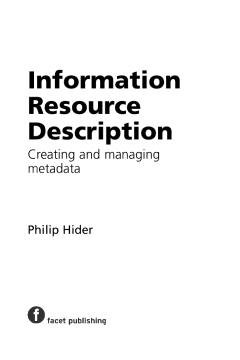
Additional Information
Book Details
Abstract
An overview of the field of information organization that examines resource description as both a product and process of the contemporary digital environment.
This timely book employs the unifying mechanism of the semantic web and the resource description framework to integrate the various traditions and practices of information and knowledge organization. Uniquely, it covers both the domain-specific traditions and practices and the practices of the ‘metadata movement’ through a single lens – that of resource description in the broadest, semantic web sense.
This approach more readily accommodates coverage of the new Resource Description and Access (RDA) standard, which aims to move library cataloguing into the centre of the semantic web. The work surrounding RDA looks set to revolutionise the field of information organization, and this book will bring both the standard and its model and concepts into focus.
Key topics include:
- information resource attributes
- metadata for information retrieval
- metadata sources and quality
- economics and management of metadata
- knowledge organization systems
- the semantic web
- books and e-books, websites and audiovisual resources
- business and government documents
- learning resources
- the field of information/knowledge organization.
Readership: LIS students taking information organization courses at undergraduate and postgraduate levels, information professionals wishing to specialise in the metadata area, and existing metadata specialists who wish to update their knowledge.
|An overview of the field of information organization that examines resource description as both a product and process of the contemporary digital environment.
This timely book employs the unifying mechanism of the semantic web and the resource description framework to integrate the various traditions and practices of information and knowledge organization. Uniquely, it covers both the domain-specific traditions and practices and the practices of the ‘metadata movement’ through a single lens – that of resource description in the broadest, semantic web sense.
This approach more readily accommodates coverage of the new Resource Description and Access (RDA) standard, which aims to move library cataloguing into the centre of the semantic web. The work surrounding RDA looks set to revolutionise the field of information organization, and this book will bring both the standard and its model and concepts into focus.
Key topics include:
• information resource attributes
• metadata for information retrieval
• metadata sources and quality
• economics and management of metadata
• knowledge organization systems
• the semantic web
• books and e-books, websites and audiovisual resources
• business and government documents
• learning resources
• the field of information/knowledge organization.
Readership: LIS students taking information organization courses at undergraduate and postgraduate levels, information professionals wishing to specialise in the metadata area, and existing metadata specialists who wish to update their knowledge.
